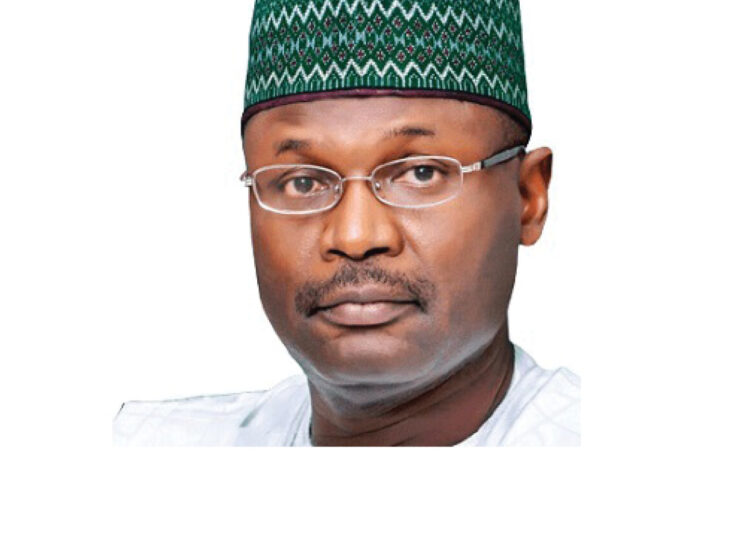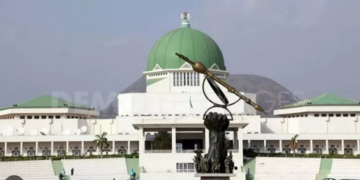The electoral reforms championed by the immediate past Chairman of the Independent National Electoral Commission (INEC), Prof. Mahmood Yakubu, have been applauded by the Inter-Party Advisory Council (IPAC).
The council, comprising all registered political parties in Nigeria, noted that Yakubu changed the country’s electoral processes and terrain through the massive deployment of technology.
At a colloquium yesterday in Abuja on 10 years of Yakubu’s leadership as INEC chairman, IPAC national chairman Alhaji Yusuf Dantalle said multiple voting during the elections became difficult because of Yakubu’s far-reaching changes.
Dantalle said the votes of Nigerians actually counted during the general elections conducted by Yakubu, despite voter apathy, adding that with the technological innovations introduced by Yakubu’s leadership, it became difficult for political parties to manipulate the system through the use of fake voter cards while also ensuring that only registered voters participated.
He said, “In the past, votes were manufactured, results were announced, and you had 20-something million, 30-something million. What INEC did under Professor Mahmood was to first clean the voter’s register using technology, and now, you cannot have more than one person on the register.
“The name you have here, if you go to Bayelsa State, is the same person; if you go to Akwa Ibom. So, with that process, the voter’s list was cleaned up. There are no more underage voters that we used to have.
“We have seen fake Permanent Voter Cards (PVCs) produced and thrown in the gutter. They were not from INEC, and those PVCs could not pass the test of BVAS because they were fake.
That was because of the technology introduced under the leadership of Professor Mahmood.
“So, when the election was conducted in 2023, people complained about voter apathy. But the truth is that, despite voter apathy, politicians no longer manufacture votes. The votes you saw during the election are the actual votes from Nigerians and nobody could vote more than once,” he said.
Justifying his claim, Dantalle said, “We saw an election where a sitting governor lost an election to the Senate. It happened in Enugu, Benue and Kebbi, where sitting governors couldn’t win because votes counted.
We saw a Peter Obi who does not have councillors anywhere, no local government chairman defeating the incumbent president in Lagos because votes counted.”
Dantalle said Prof. Mahmood’s technologies introduced during his tenure at INEC were homegrown, built in-house by the commission’s staff.
He said that in the past, political parties could manipulate the process of submitting names of their candidates for every election, adding that the Mahmood era ended that and the nefarious activities associated with it.
In his lecture titled, “INEC under Prof. Mahmood Yakubu”, the keynote speaker, Prof. Emmanuel Aiyede of the University of Ibadan (UI), applauded the former INEC chairman for introducing technology into the nation’s electoral system.
Aiyede said, however, that technology alone is not enough to ensure a credible election and called for a forward-looking approach to handling electoral reforms, not merely one based on what has been achieved over the last 10 years.
He said, “The true measure of leadership lies not merely in what one accomplishes but in the structures one leaves behind to sustain progress. Under his stewardship, Nigeria’s electoral journey has been redefined by a quiet but profound technological revolution.
“From the Bimodal Voter Accreditation System (BVAS) and the INEC Results Viewing Portal (IReV) to the digitalisation of candidate nomination, observer accreditation, and voter registration, technology has become the new grammar of electoral credibility. These tools did not emerge by accident; they were the product of foresight, an understanding that democracy in the twenty-first century must rest on verifiable data, not just declarations.
“However, Yakubu’s real legacy lies not in the machines themselves, but in the institutional mindset that now governs their use. He helped shift INEC from seeing technology as a novelty to treating it as infrastructure, as integral to electoral governance as polling booths and ballot boxes.
“The commission under his watch learned that technology cannot substitute for integrity, but it can amplify it. It cannot eliminate manipulation but make manipulation traceable, accountable, and therefore riskier.
“The next frontier for Nigeria’s democratic consolidation lies in deepening and sustaining this institutional culture. As INEC enters a post-Yakubu era, the challenge will be to preserve the gains of digital transparency while addressing the operational bottlenecks that accompany them,” he said.
The executive director, Centre for Transparency Advocacy, Faith Nwadishi, said the event was organised to reflect on a defining era in Nigeria’s democratic journey, adding that the colloquium is not merely to celebrate tenure, but to reflect, review, and recommend — to identify what has worked, where challenges remain, “and how we can collectively strengthen the electoral process as we advance.
She said Prof. Yakubu “institutionalised continuous voter registration, expanded stakeholder consultations, and strengthened the Commission’s internal systems. Importantly, he opened INEC’s doors wider to civil society, media, and other groups, and prioritised transparency in election management.
“He was very gender sensitive as he created the first creche in the INEC headquarters, allowing nursing mothers to care for their babies while at work.
“Yet, as we reflect, we must also acknowledge the persistent challenges — the growing security threats that have made elections in some parts of Nigeria extremely difficult; vote buying and voter intimidation that undermine the will of the people; and voter apathy, which threatens the very foundation of democracy.
“These challenges remind us that innovation alone is not enough — our collective commitment, institutional reform, and political will must match our technological advancements,” she said.





